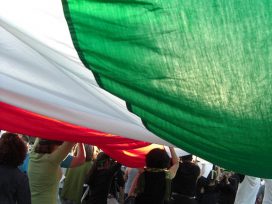Articles
Read more than 6000 articles in 35 languages from over 90 cultural journals and associates.
"The real problem is not the recession"
Blätter für deutsche und internationale Politik, Germany
As an independent, self-financing publication, Blätter is a relative exception in the journals field. So far, it has not felt the impact of recession, says editor Daniel Leisegang, who sees the big challenges in generating demand for political content and keeping pace with media change.
"Media change is a slow process"
Glänta and Ord&Bild, Sweden
A long-standing media diversity policy in Sweden means journals such as Glänta and Ord&Bild enjoy an exceptional degree of stability. The question is how, amidst the massive changes affecting other media, they can turn the particular character of the cultural journal into a strength.
"Our reach is very limited, and this makes us vulnerable"
Host, Czech Republic
Heavy dependency on steadily declining state funds makes the situation for Czech journals unsustainable, says Host editor Marek Seckar. As a small sector of the cultural budget, journals funding barely registers wider policy trends. It is precisely this inconspicuousness that gives cause for concern.
"Meritocracy is a ghost"
Intellectum, Greece
With sharp drops in advertising revenue and drastic public cuts, the financing system for Greek journals has never been less transparent. As the “networking” factor attains new levels, meritocracy seems a far-off dream says Intellectum editor Victor Tsilonis.
Internationalizing itself following a 100 per cent defunding by the Arts Council of England, Mute magazine is developing new publishing strategies in the digital field while retaining a strong commitment to the long-form text, writes director Simon Worthington.

Decadence or renewal?
Deciding the future of the Mediterranean
Regeneration of the Mediterranean region must draw on its legacy of cosmopolitan democracy while offering prospects for ecological, energy-political and scientific development. The Mediterranean may then re-enter the European consciousness as the Mare nostrum, with all the joint responsibilities that entails.

Next stop sell-out city
Urban activism in Hamburg
Is it chance or social class that determines where one gets on and off the bus? “Right to the City” activist Nicole Vrenegor takes the number 3 from Hamburg’s outskirts to the new HafenCity development, stopping along the way to talk to people who oppose the sell out of the city.

Glocal democracy in embryo
On the pioneering role of European harbour cities
The globalization of the harbour workforce challenges the democratic political culture typical of traditional port cities. As prime examples of the convergence of economics and multi-culture, European harbour cities can lead the way in revitalizing forms of urban citizenship.
Thousands of Europeans die annually waiting for a new kidney, heart or liver. At the same time, the black-market trade in organs is thriving, as a recent scandal in Germany has shown. So should organ trading be legalized? Slavenka Drakulic, herself a two-time kidney transplant patient, argues the pros and cons.

Though it had the potential to turn violent, Iran’s Green Movement was determined to seek dialogue with the state. In doing so, it put back in the bottle the genie of violence released by the Khomeini revolution thirty years earlier, writes Ramin Jahanbegloo.
The global expansion of higher education allows work traditionally reserved for the West to be done more cheaply and just as well in emerging nations, write Phillip Brown and Hugh Lauder. The result is that the wages and working conditions of western employees no longer set the global benchmark.
The controversy around the ruling by a German court that circumcision counts as physical injury once again serves to illustrate conflicts over the position of religion in secular society. Toby Lichtig asks whether male circumcision is a harmless ethnic signifier or the infliction of genuine harm.
Future money
A conversation with James Robertson
Understanding the need to combine economics and ethics amounts to a “Copernican revolution”, says James Robertson, co-founder of the New Economics Foundation. The survival of our species depends on our making the money system work in ways that will “enable and conserve”.
The presidential referendum controversy represents an all-time low for post-communist Romanian politics, writes Valeriu Nicolae. Corruption isn’t likely to disappear any time soon, since an honest political elite working to reform society would lead to a collapse of the entire system.